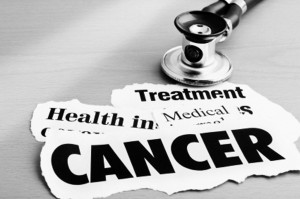 More than a quarter of a million people are diagnosed with cancer in the UK each year. The earlier a cancer is found, the more likely it is that treatment will be successful. Knowing what changes to look for and when to see your GP could make a real difference.
More than a quarter of a million people are diagnosed with cancer in the UK each year. The earlier a cancer is found, the more likely it is that treatment will be successful. Knowing what changes to look for and when to see your GP could make a real difference.
Cancer is not a single disease with a single type of treatment. There are more than 200 different kinds of cancer, each with its own name and treatment.
What is cancer?
Our whole body is made out of cells, just like the bricks that join together to make a building. Throughout our lives these cells grow and are replaced in a controlled and orderly manner just like leaves on a branch of a tree are shed and grow back each year. In cancer there is out of control ‘abnormal’ cell growth which can form lumps that keep growing and damages the ‘normal’ cells. If left untreated they can spread to other parts of the body and cause more widespread disease which can be serious.
What causes cancer?
• Carcinogens such as:
– Tobacco
– Asbestos
– Arsenic
– Prolonged Radiation from the sun, or from gamma rays and x-rays
– Car exhaust fumes
– Genes- things that run in families and is inherited from family members
– Other causes:
– As we get older the risk is higher
– Certain infections such as Human papilloma virus (HPV) which can cause cervical cancer, Hepatitis B and C which can cause liver cancer and HIV.
What should you look out for?
Remember many of the symptoms listed below can occur due to other diseases and it is often NOT due to cancer.
However it is worthwhile seeing your GP if you have any of these symptoms:
– A mouth or tongue ulcer that lasts longer than three weeks
– A cough or croaky voice that lasts longer than three weeks
– difficulty swallowing (food getting stuck in your food pipe) or Persistent indigestion
– A change to more frequent bowel motions for 6 weeks or more
– Blood in your poo
– Women: Unexplained vaginal bleeding after the menopause or between periods
– Problems passing urine
– Blood in your urine
– A change in the size, shape or colour of a mole on the skin
– An unexplained pain or ache that lasts longer than four weeks
– An unusual lump or swelling anywhere on your body, especially in the breast/ or changes to the breast
– Unexplained weight loss
– or heavy night sweats
– A sore that won’t heal after several weeks
– Breathlessness
– Coughing up blood
Why is spotting cancer early so important?
The good news is that more people than ever are surviving cancer.
Cancer survival rates in the UK have doubled in the last 40 years. This is mainly because of better treatments, screening and earlier diagnosis. When bowel cancer is caught at the earliest stage, more than nine in 10 people can be treated successfully.
But thousands more cancer deaths could be prevented each year if we improved early diagnosis and treatment even further. So if you notice any unusual or persistent changes in your body, go and see your doctor. If it is something serious, finding it at an early stage and getting treatment started promptly offers a better chance of beating the disease.
Do attend screening tests when you are invited- you have nothing to lose and everything to gain!
All women are invited for the following screening tests:
– Breast screening (mammogram). These detect breast cancers at an early stage and women are invited between the ages of 50 and 70 years
– Cervical screening- This is to detect the cancer in the neck of the womb. Women are invited every 3-5 years from their twenties to their mid-sixties.
For both men and women:
– Bowel cancer screening. Older men and women receive this screening test every few years through the post. A small sample of their poo is sent off and the lab will check for hidden traces of blood in the poo. These tiny traces of blood can be due to cancer or changes in the bowel that can lead to cancer.
Further information
www.macmillan.org.uk or telephone 0808 808 00 00
(Monday-Friday, 9am-8pm).
Or
For more about the signs and symptoms of cancer visit
• spotcancerearly.com or
• cruk.org/cancer-help
